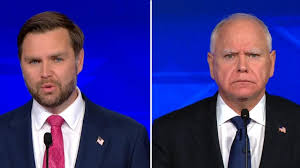Image Credit: CBS News Feed
On October 1, 2024, Senator JD Vance (R-Ohio) and Governor Tim Walz (D-Minnesota) squared off in the only Vice-Presidential debate before the upcoming November election. In the high-stakes world of American politics, Vice-Presidential debates often serve as a litmus test for candidates’ readiness to step into leadership roles. The debate between Vance and Walz, while seen as more civil and cordial than the Trump-Harris debate held on September 10, also had a clear winner: JD Vance.
Well-prepared, reserved, articulate, and polite, Senator Vance answered the initial question on foreign policy–and all subsequent ones on domestic policy–with aplomb and wisdom. When asked if the United States should support a preemptive attack by Israel on Iran, Vance emphasized that Israel has a right to defend itself, and in that same light he would trust any Israeli decision to retaliate.
Governor Walz, however, seemed nervous and surprised, citing random facts about Hamas’s attack on October 7, the taking of hostages and describing Israel’s right to defend itself as “fundamental.” He in fact dodged the issue of retaliation. Instead, Mr. Walz preferred to attack Donald Trump’s age and character, implying that the former President could not make any viable foreign policy decisions whatsoever.
Governor Walz also stumbled over the direct question of whether or not he actually visited Hong-Kong during the Tiananmen Square student protests and massacres in Beijing between April 15 and June 4, 1989. He admitted he mis-spoke about the dates, adding “I can be a knucklehead at times.”
In contrast, from the outset, Senator Vance displayed a commanding presence. His confidence and poise set the tone for a spirited exchange. He came prepared with specific policy proposals, deftly weaving in personal anecdotes that illustrated his commitment to the issues. He did not come across as “weird,” as Tim Walz has publicly claimed. To the contrary, in the debate, Vance humanized his platform, making it relatable to voters who are often overwhelmed by political jargon and simplistic partisan media portrayals of bad guys versus good guys. . Vance’s focus on economic growth, job creation, fixing the immigration problem, and national security struck a chord, particularly in a climate where these concerns dominate public discourse.
In contrast, Governor Walz often seemed reactive in his responses. His arguments lacked the same level of conviction and clarity that Vance demonstrated. This disparity became evident when the two candidates tackled the pressing issue of inflation. Vance outlined a clear plan to stimulate the economy through tax reform and deregulation, appealing to voters’ immediate concerns. Walz, on the other hand, appeared to sidestep the specifics, relying more on broad statements, giving loans to first-time homebuyers, which did not fully address the complexities of the economic landscape.
On energy policy, the two men had widely different views, with Senator Vance focusing on the need to drill for oil at home and sell it overseas to become energy self-sufficient, create jobs, and pay down our rising national debt. Governor Walz countered with the threat of climate change and the need to invest in clean energy to help solve the climate crisis.
A particularly memorable moment in the debate came when the candidates discussed healthcare. Vance articulated a vision for a more efficient healthcare system that emphasizes innovation and competition, highlighting the need for reforms that empower patients. His personal connection to the issue—drawing from stories of families struggling with medical costs—added emotional weight to his argument. Walz’s response, while touching on the importance of accessibility, lacked the same level of actionable solutions. This distinction reinforced Vance’s image as a candidate who not only understands the issues but is also ready to take decisive action.
On the issue of abortion, Senator Vance supported the Supreme Court’s recent decision to give individual states rather than the federal government the right to decide. To his credit, Vance conceded that Republicans must do a better job understanding and legislating on abortion, and that this presented an opportunity to work across the aisle with Democrats. Offering such a political olive branch has become rare today in our tribal and polarized political communities. This also demonstrated that Senator Vance understands the need for compromise as outlined in our Constitution.
Moreover, Vance skillfully dismantled claims about government spending, illustrating how his approach would lead to sustainable fiscal policies rather than the unchecked expenditure that has characterized the Biden-Harris administration. This tactic not only underscored his expertise but also painted him as a candidate focused on long-term solutions rather than short-term political gain.
One of the most compelling aspects of Vance’s performance was his ability to connect with voters on a personal level. His down-to-earth style and authentic demeanor created a sense of relatability often missing in political debates. In an era when many voters feel disillusioned with politicians, Vance’s genuine approach helped to foster trust and credibility. He didn’t just speak to the audience; he spoke for them, addressing their fears and aspirations directly.
As the debate unfolded, it became increasingly clear that Vance’s strategic use of rhetoric and narrative significantly overshadowed Walz’s responses. While both candidates brought their respective perspectives to the table, Vance’s blend of assertiveness and empathy set him apart. He emerged not just as a candidate for Vice President but as a potential leader capable of uniting diverse factions within the electorate.
In conclusion, the October 1, 2024, Vice-Presidential debate was a decisive moment for Senator JD Vance. His performance illustrated a candidate who is not only ready to assume the responsibilities of high office but also one who can inspire and galvanize support across a broad spectrum of voters. As the election approaches, Vance’s clear win in this debate has solidified his position as a formidable contender, leaving a lasting impression that could very well shape the political landscape for years to come.




